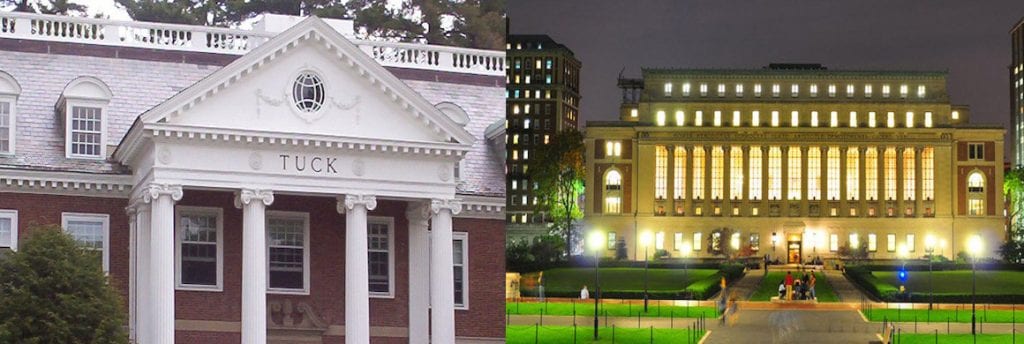School v. School: Dartmouth Tuck or Columbia Business School?

It’s tough enough to decide exactly where and what you want to study. But when prospective b-schoolers begin to weigh less tangible but equally important factors like reputation, alumni network, and return on investment, that’s when the MBA selection process really becomes daunting. This is especially true when you size up two MBA programs of comparable stature.
We’d also argue that’s where the process becomes interesting. So don’t fret! Let our School v. School series to do some of the heavy lifting for you. See below for our blow-by-blow comparison of two reigning champions of business education: Dartmouth’s Tuck School of Business and Columbia Business School.
Dartmouth or Columbia: What is Right for You?
Dartmouth College Tuck School of Business
Tucked … away in a small, rural campus in Hanover, New Hampshire, the Tuck School of Business boasts a tight-knit student body and an intimate setting. Over half its student body lives in campus housing, and MBAs belong to small group study teams that convene at the start of their programs.
Tuck consistently ranks among the top business schools in the country. U.S. News and World Report ranks Tuck 8th in management and 10th overall. Tuck offers a traditional full-time, two-year MBA with a variety of concentrations, as well as several short-term executive education programs.
Why Tuck?
- The Advanced Management Program offers “a transformative experience for senior business leaders who seek to innovate, drive growth, and create value.” The Minority Business Programs focus on guiding business owners as they “adjust their strategy, refine their operations, and build their enterprises to scale.”
- Additionally, Tuck offers two programs designed for non-traditional b-schoolers: the Business Bridge Program is a four-week intensive mini-MBA program for liberal arts students. Next Step is two-week program for military veterans and former athletes.
- Tuck is known for its community, with a focus on personal connections, including self-initiated interviews, accessible faculty, and a generous alumni network.
What Is Missing?
- The opportunities that come packaged with a major city and business hub are missing from Tuck’s rural setting.
- While Tuck’s tuition is roughly $5,000 more than Columbia’s, its total costs are $110,173—over $1,200 more than Columbia’s per year.
Tuck vs. Columbia MBA Rankings
| Publication | Tuck School of Business | Columbia Business School |
|---|---|---|
| U.S. News & World Report | 10 | 9 |
| The Economist (Global) | 12 | 11 |
| Financial Times (Global) | 15 | 9 |
| Forbes | 5 | 6 |
| Bloomberg Businessweek | 19 | 7 |
Columbia Business School
Located in the heart of New York City, Columbia Business School—like Tuck—is one of the oldest in the country. Unlike Tuck, Columbia students are in immediate proximity to highly coveted networking, partnership, and placement opportunities of a global business hub.
Columbia’s Programs
Columbia also routinely ranks among the top b-schools in the country—10th in management and 9th overall. Columbia also offers a full-time two-year MBA with various concentrations, Executive MBA, Doctoral Program, an accelerated MBA, multiple Masters of Science options and Executive Education Programs.
Why Columbia?
- The Executive MBA Program offers a traditional MBA program but on a schedule that accommodates full-time employment.
- The Doctoral Program offers a Ph.D. in multiple disciplines and “prepares individuals who have a deep interest in shaping the business research and policy of tomorrow through academic research.”
- First-year students can apply for admittance into the Value Investing Program where they learn to identify, value, research and manage investments.
What Is Missing?
- Columbia is reported to have an intimidating 17 percent acceptance rate—compared to Tuck’s ever-so-slightly more accessible 23 percent
- Only 18 percent of Columbia’s faculty members identify as women, compared to 23 percent at Tuck—both reflect a shamefully low national statistic.
Tuck vs. Columbia MBA Cost Per Year
| Dartmouth Tuck School of Business | Columbia Business School | |
|---|---|---|
| Tuiton | $72,150 | $67,532 |
| Full-Cost | $110,173 | $97,580 |
Both MBA programs are among the most elite in the country, and offer some pretty appeasing salary possibilities.
Tuck vs. Columbia MBA Salary
| Tuck School of Business | Columbia Business School | |
|---|---|---|
| MBA Graduate Salary Range (2018) | $60,000-$215,000 | $52,000– $308,000 |
| MBA Graduate Median Base Salary (2018) | $130,000 | $130,000 |
With comparable tuitions, post-graduate salaries, and employment rates, they contrast most when it comes to class size. While Tuck promises a secluded and intimate B-school setting, it’s tough to beat Columbia’s location in a global financial capital.
For additional insight, be sure to check out the news at both Tuck and Columbia.
